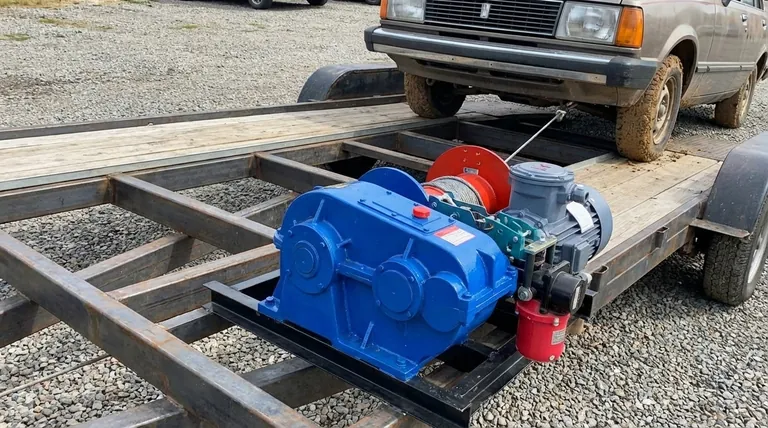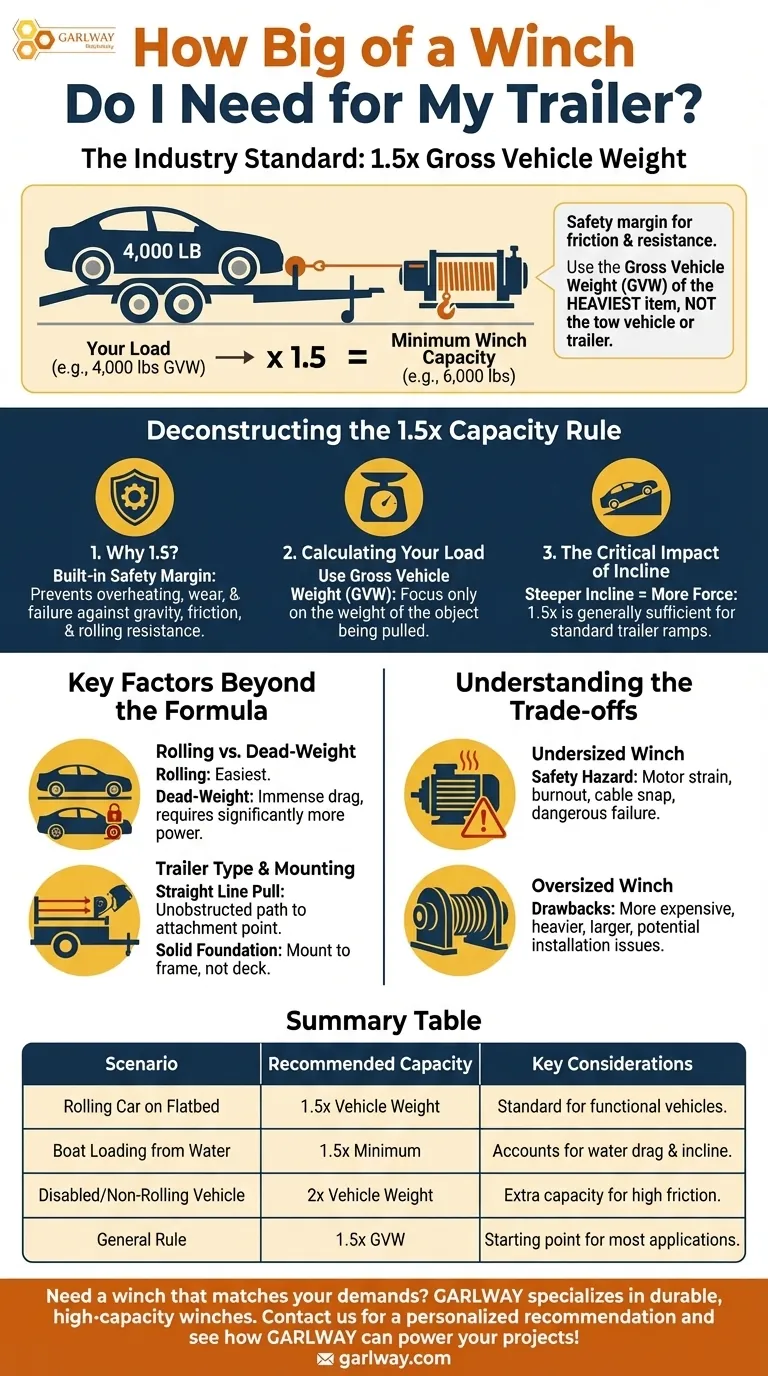The industry standard is to choose a winch with a pulling capacity of at least 1.5 times the gross weight of the vehicle you intend to pull. For example, to load a 4,000-pound car onto a trailer, you would need a winch with a minimum rated capacity of 6,000 pounds (4,000 lbs x 1.5). This safety margin accounts for the real-world friction and resistance you will encounter during loading.
While the 1.5x rule is the correct starting point, your final decision must account for the condition of what you're pulling. A freely rolling car on a flat surface requires far less effort than a disabled vehicle with locked brakes or a boat being pulled up a steep, wet ramp.

Deconstructing the 1.5x Capacity Rule
The simple formula provides a critical safety buffer. Understanding why it exists helps you make a more informed decision.
Why 1.5? The Built-in Safety Margin
A winch rating represents its capacity on a flat, level pull with no resistance. In reality, you are always working against forces like gravity (on an incline), rolling resistance of tires, and friction from a non-rolling load.
The 1.5x multiplier ensures the winch motor isn't constantly operating at its maximum limit, which prevents overheating, premature wear, and potential failure.
Calculating Your Load Weight
The weight you must use for this calculation is the Gross Vehicle Weight (GVW) of the car, boat, or object being pulled.
Do not use the weight of the trailer or the tow vehicle. Focus only on the heaviest item the winch will be responsible for loading.
The Critical Impact of Incline
Pulling a vehicle up the incline of a trailer ramp dramatically increases the force required. The steeper the ramp, the greater the effective load on the winch.
The 1.5x rule is generally sufficient to handle the inclines of standard car and boat trailers.
Key Factors Beyond the Formula
The simple calculation is just one piece of the puzzle. The specific application determines whether you should stick to the 1.5x rule or consider a higher capacity.
Rolling vs. Dead-Weight Pulls
A vehicle that can roll freely on its own wheels is the easiest scenario.
A disabled vehicle with locked wheels, stuck brakes, or significant damage creates a "dead-weight" pull. This introduces immense drag, which requires significantly more pulling power.
Trailer Type and Mounting Location
The winch must be mounted so the cable or strap has a straight, unobstructed line to the vehicle's attachment point (e.g., a car's tow hook or a boat's bow eye).
On an enclosed trailer, a winch is invaluable for pulling a car in without needing to squeeze out the door. For boat trailers, the winch mount height must align with the boat's bow eye.
Ensuring a Secure Foundation
The winch must be mounted to a solid part of the trailer's frame. It can be bolted directly or attached via a dedicated steel mounting plate.
Never mount a winch to a weaker part of the trailer deck, like wood planks or thin sheet metal. The pulling force can easily rip it free, creating a dangerous situation.
Understanding the Trade-offs
Choosing a winch isn't just about getting the biggest one you can find. It's about finding the right balance of capacity, cost, and practicality.
The Risk of an Undersized Winch
An undersized winch is a serious safety hazard. It will strain its motor, leading to overheating and burnout.
Worse, the excessive load can cause the cable to snap or the winch to break free from its mounting, turning it into a dangerous projectile.
The Downside of an Oversized Winch
While less dangerous, an excessively large winch has its own drawbacks. It will be more expensive, heavier, and physically larger.
This can create installation challenges on smaller trailers where space is limited and add unnecessary weight to your trailer's tongue.
Making the Right Choice for Your Goal
Use your specific loading scenario to finalize your decision on winch capacity.
- If your primary focus is loading a functional, rolling car onto a flatbed trailer: The 1.5x GVW rule is a reliable and safe guideline.
- If your primary focus is loading a boat from the water: The 1.5x rule is the minimum you should consider, as water and ramp incline add significant resistance.
- If your primary focus is loading disabled or non-rolling vehicles: This creates substantial drag, so you should choose a winch with a capacity closer to 2x the vehicle's weight for a reliable safety margin.
Ultimately, selecting the right winch ensures your loading process is not only possible but also safe and efficient every time.
Summary Table:
| Scenario | Recommended Winch Capacity | Key Considerations |
|---|---|---|
| Rolling Car on Flatbed | 1.5x Vehicle Weight | Standard for functional vehicles with minimal resistance. |
| Boat Loading from Water | 1.5x Minimum (Consider Higher) | Accounts for water drag and ramp incline. |
| Disabled/Non-Rolling Vehicle | 2x Vehicle Weight | Extra capacity for locked brakes or high friction. |
Need a winch that matches your trailer's demands? GARLWAY specializes in durable, high-capacity winches designed for construction companies and contractors worldwide. Whether you're loading heavy machinery or vehicles, our winches ensure safety and efficiency. Contact us today for a personalized recommendation and see how GARLWAY can power your projects!
Visual Guide

Related Products
- Electric and Hydraulic Winch for Heavy Duty Applications
- Warn Winch Windlass Boat Trailer Winch
- Electric 120V Boat Winch by Badlands
- Best 18000 Pound Drum Anchor Trailer Winch
- 12000 lb Heavy Duty Electric Boat Winch
People Also Ask
- How do I choose an electric winch? A guide to safe and effective pulling power.
- Can you use an electric winch manually? A Guide to Dual-Functionality Winches
- What is the difference between electric winch and electric hoist? Essential Safety & Application Guide
- How to maintain an electric winch? Ensure Peak Performance & Reliability for Your Projects
- How long can you run an electric winch? Master Safe, Efficient Vehicle Recovery


















